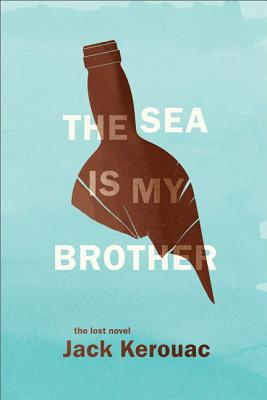Written seven years before The Town and The City officially launched his writing career, The Sea Is My Brother marks a pivotal point in which Kerouac began laying the foundations for his pioneering method and signature style. A clear precursor to such landmark works as On the Road, The Dharma Bums, and Visions of Cody, it is an important formative work that bears all the hallmarks of classic Kerouac: the search for spiritual meaning in a materialistic world, spontaneous travel as the true road to freedom, late nights in bars and apartments engaged in intense conversation, the desperate urge to escape from society, and the strange, terrible beauty of loneliness.
Joe says:
"During one of his stints in the Merchant Marine during World War II, a young man wrote his first novel. This writer was twenty-one years old and named Jack Kerouac. His novel was about two young men who meet in New York City, party hard, and then ship off on a Merchant Marine ship. The author would not see this novel published, but he would publish several novels in the years ahead, to much acclaim. The Sea Is My Brother is Kerouac's long lost, first novel. I consider myself a fairly big fan of Kerouac's, and don't recall ever reading about this novel. It was discovered among the papers of his wife, Stella, and is only now being published.
Some of the early reviews of the novel have said that this book will only really appeal to fans of Kerouac. But I don't think this is true. The story is a very interesting picture of a world most of do not know: the life of a merchant seaman. Kerouac, and later, Allen Ginsberg, both wrote about their adventures at sea, mostly in their journals, which were not nearly as widely read as their major works. But I was fascinated by the daily life on a ship, and the hours idled away prior to shipping out. In some ways, reading this novel made more sense of what I knew about these writers: that they often had long stints of time in which it seemed all they did was spend their days in a blur of booze, women, and smoke... The Sea Is My Brother showed, to me at least, why these seamen did this: they were in between long periods at sea, stuck on a boat in a dangerous sea (weather, German U-Boots), doing their hard-labor jobs, waiting to get back off the boat...
The Sea Is My Brother is also interesting to see the young Kerouac beginning to sort out his art. His first published novel, The Town And The City, would not be seen in print until 1950, seven years after Kerouac wrote The Sea. The Town And The City is often compared to the work of Thomas Wolfe, a favorite write of Kerouac's at the time. In The Sea Is My Brother, Wolfe is mentioned several times, mostly by characters either quoting him, or talking about reading his works.
While The Sea does not have the lyrical bop-prosy that would make Kerouac's later work stand out, it does show a writer who's got 'something special'... Perhaps it's his command of the story: he somehow maintains control of a plot line that seems to verge on the edge of going out of control. He has the power to bring the reader directly into the page. You're sitting in the smokey bars with the characters, you're searching for your socks in the morning with Wesley, the main character. You can hear the jazz they're listening to, can feel the roil of the sea underneath the cold steel of the ship. There are times when the writing is clunky, and sometimes descriptive phrases stand out, the mark of a young writer who's not fully honed his craft. But as the strength of the narrative takes hold, these become minor quibbles. And while I wouldn't rate this one of Kerouac's best novels, I definitely think this is one worth reading, whether you're a huge Beat fan or not. To be taken into a world not often written about, the life of the merchant seaman during World War II, is a worthy-enough venture. To be taken into this world by one of the greatest American novelists of the twentieth century as he himself was there, is priceless."


No comments:
Post a Comment